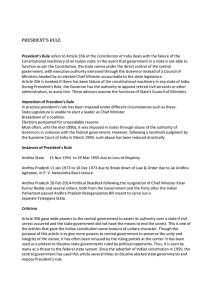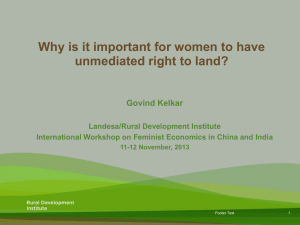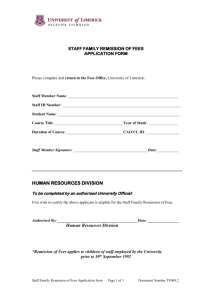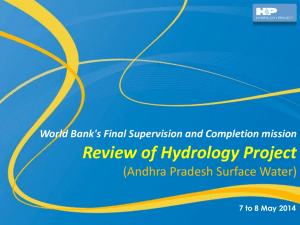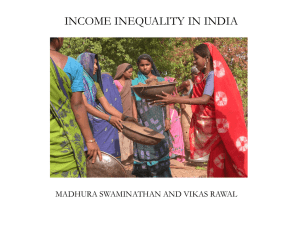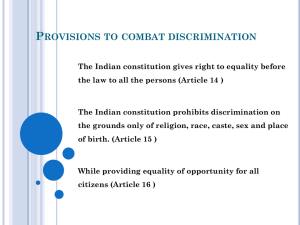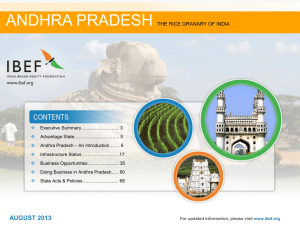andhra pradesh land revenue (enhancement) act, 1967
advertisement
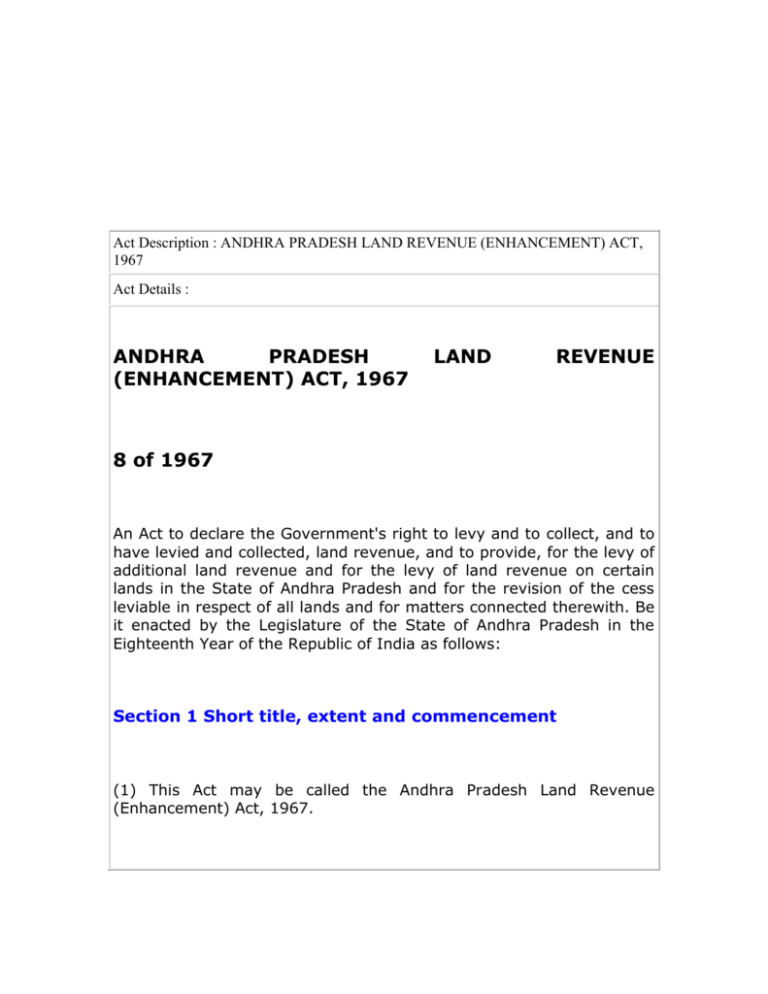
Act Description : ANDHRA PRADESH LAND REVENUE (ENHANCEMENT) ACT, 1967 Act Details : ANDHRA PRADESH (ENHANCEMENT) ACT, 1967 LAND REVENUE 8 of 1967 An Act to declare the Government's right to levy and to collect, and to have levied and collected, land revenue, and to provide, for the levy of additional land revenue and for the levy of land revenue on certain lands in the State of Andhra Pradesh and for the revision of the cess leviable in respect of all lands and for matters connected therewith. Be it enacted by the Legislature of the State of Andhra Pradesh in the Eighteenth Year of the Republic of India as follows: Section 1 Short title, extent and commencement (1) This Act may be called the Andhra Pradesh Land Revenue (Enhancement) Act, 1967. (2) It extends to the whole of the State of Andhra Pradesh. Section 2 Definitions In this Act, unless the context otherwise requires, (a) "Andhra Area" means the territories of the State of Andhra Pradesh other than the Telangana area; (b) "dry land" means the land registered as dry manavari, asmantari, baghat or garden land, or special rate dry land in the land revenue accounts of the Government or assessed as such: (c) "fasli year" means a period of twelve months commencing on the first day of every year. (d) "Government" means the State Government; (e) "land" means wet or dry land; (g) "law" includes any enactment, ordinance, regulation, order, bye law, rule, scheme, notification or other instrument having the force of law; (h) "notification" means the notification published in the Andhra Pradesh Gazette; (i) "pattadar" includes every person who holds land directly under the Government under a patta or whose name is registered in the land revenue accounts of the Government as pattadar or as occupant or khatadar and who is liable to pay land revenue; (j) "prescribed" means prescribed by rules made under this Act; (k) "Revenue Divisional Officer" means the Revenue Divisional Officer in whose jurisdiction the land is situate and includes any officer of the Revenue Department not below the rank of Revenue Divisional Officer empowered by the Government to exercise the powers and perform the functions of the Revenue Divisional Officer under this Act. (1) "State" means the State of Andhra Pradesh; (m) "Tahsildar" means the Tahsildar in whose jurisdiction the land is situate and includes a Deputy Tahsildar in independent charge of a taluk or sub taluk and any other officer of the Revenue Department not below the rank of a Deputy Tahsildar empowered by the Government to exercise the powers and perform the functions of the Tahsildar under this Act; (n) "Telangana area" means the territories specified in sub section (1) of Section 3 of the States Re organisation Act, 1956 (Central Act 37 of 1956). (o) "wet land" means land registered as wet, single crop wet or double crop wet or compounded double crop wet or special rate wet land, in the land revenue accounts of the Government, or assessed as such. Section 2A "Right of the Government to levy and collect land revenue in respect of every land in the State and validation of the settlement and re settlement notifications (1) The Government shall have the right to levy and collect the land revenue in respect of every land in the State and it is hereby declared that the Government shall be deemed always to have had the right aforesaid; and all land revenue levied and collected shall be deemed to have been levied and collected by the Government under the authority of law. Section 3 Power of Government to levy and collect additional land revenue (2) The additional land revenue referred to in sub section (1) in respect of any land shall be in addition to the land revenue payable by a pattadar in respect of that land. Section 4 Declaration of certain wet lands as dry lands and the determination of land revenue payable thereon (1) Every wet land in the State which is registered in the land revenue accounts of the Government as being irrigated under any well, spring, channel, parekalava, nadinala, vagunala, kasam, sona, bila, uppalwat bonda, doruvu, bhurki, kole or by cross bunding, shall be treated as dry land ; and the Tahsildar shall after giving an opportunity to the pattadar to make his representation determine the land revenue payable on that land for a fasli year, having due regard to the land revenue payable for a dry land of similar classification in the vicinity. (2) There shall be levied and collected by the Government from the pattadar for such dry land for every fasli year, the land revenue determined by the Tahsildar under sub section (1) in lieu of the land revenue payable thereon immediately before the commencement of this Act. (3) There shall also be levied and collected by the Government from the pattadar for such dry land an additional land revenue as provided in Section 3. Section 5 Levy of land revenue in respect of lands not assessed to land revenue (1) In the case of any land not assessed to land revenue, the Tahsildar shall, after giving an opportunity to the pattadar to make his representation, determine the land revenue payable on that land for a fasli year, having due regard to the land revenue payable for dry or wet land of similar classification in the vicinity, as the case may be. (2) There shall be levied and collected by the Government from the pattadar for such land, for every fasli year, the land revenue determined under sub section (1) and the additional land revenue as provided in Section 3. Section 6 Exemption of pattadars from payment of land revenue and additional land revenue in certain cases (1) Every pattadar who is liable to pay for the fasli year which commenced on the first day of July 1967, or for any subsequent fasli year, on all the lands held by him, an aggregate amount not exceeding rupees ten towards the land revenue and the additional land revenue, shall be exempt from the land revenue and the additional land revenue payable in respect of the dry land held by him. (2) If any question arises as to whether any pattadar is exempt from the payment of land revenue and the additional land revenue or the dry assessment component thereof under this section in respect of any land held by him, the Tahsildar shall, after giving an opportunity to the pattadar concerned, decide such question and his decision shall, subject to the provisions of section 12 be final. (3) Notwithstanding anything in the Andhra Pradesh (Andhra Area) District Boards Act, 1920, the Andhra Pradesh (Andhra Area) Elementary Education Act, 1920 and the Andhra Pradesh (Telangana Area) District Boards Act, 1955, every pattadar mentioned in sub section (1) or sub section (1-A) shall be liable to pay the cess at the rate of five paise in the rupee of the annual rent value of all the lands held by him, or five paise in every rupee of land revenue and the additional land revenue or the dry assessment component thereof, as the case may be, which would have been leviable in respect of any land held by him, if the pattadar had not been exempt from the payment of the land revenue and additional land revenue or the dry assessment component thereof under that section. Explanation I:- For purposes of this section, the expression dry lands shall not include dry lands which are irrigated during the fasli year from any Government source of irrigation other than a source of irrigation specified in sub section (1) of Section 4. Explanation III: In computing the extent of land held by a pattadar for the purpose of sub section (1-A) 0.404686 hectare (one acre) of wet land shall be deemed to be equal to 0.809372 hectare (two acres) of dry land. Explanation IV:- For the purpose of computing the dry assessment component under sub section (1-A) twenty per cent of the consolidated wet assessment shall be deemed to be the dry assessment component. Explanation V:- For the purpose of sub section (1-A), the expression "additional land revenue in so far as it relates to wet lands shall include the additional land revenue assessment on wet lands payable under the Andhra Pradesh Land Revenue (Additional Wet Assessment) Act, 1975. Section 7 Determination of additional land revenue (1) The additional land revenue payable under this Act by each pattadar in respect of his land in every village shall ordinarily be determined for the first fasli year after the commencement of this Act, and assessed by the Tahsildar in accordance with the provisions of Section 3 or Section 4 or Section 5, as the case may be. The additional land revenue so determined shall continue in force until modified by the competent authority in accordance with the provisions of this Act. (2) The Tahsildar shall cause a notice to be served on each pattadar specifying the particulars and the extent of the land held by him, the land revenue payable on that land and the additional land revenue payable under this Act and may publish the notice in such form and in such manner as may be prescribed. (3) Any person interested, and objecting to the land revenue or the additional land revenue specified in the notice may make an application in writing to the Tahsildar within thirty days from the date of service of the notice on him and the Tahsildar shall consider any such objection and pass such orders thereon as he thinks proper. Section 8 Appeal Any person aggrieved by an order passed by the Tahsildar under Section 7, may within thirty days from the date of service on him of the order, appeal to the Revenue Divisional Officer, who shall pass such order as he may think confirming, modifying or annulling the order appealed against. Section 9 Additional land revenue and land revenue payable under this Act to be treated as public revenue due upon the land The additional land revenue or land revenue payable under this Act, by a pattadar in respect of any land shall be deemed to be public revenue due upon the said land, and the provisions of the Andhra Pradesh Revenue Recovery Act, 1864, shall apply. Section 10 Remission of additional land revenue (1) Where on account of total or partial failure of crops, the land revenue has been remitted in respect of any land, in accordance with such rules as may be prescribed, the additional land revenue payable in respect of such land under this Act shall stand remitted by such amount which bears to the total additional land revenue the same proportion as the amount of land revenue remitted in respect of such land bears to the total amount of land revenue in respect of such land. (2) Where any question arises, whether any pattadar is entitled to remission of additional land revenue under sub section (1), or regarding the extent of such remission, the question shall be decided by such authority and in such manner, as may be prescribed. Section 11 Provision relating to adjustment of additional assessment already paid Where, in respect of any land, any sum has been paid by, or collected from, any pattadar as additional assessment under Andhra Pradesh Land Revenue (Additional Assessment) and Cess Revision Act, 1962 (Act XXII of 1962), such sum shall be adjusted by the Tahsildar towards the amount of additional land revenue, land revenue or cess payable in respect of the land; Provided that (a) where the sum so paid by, or collected from, the pattadar is in excess of the said amount, such excess shall be adjusted towards the land revenue, additional land revenue or cess that may become payable thereafter, in such manner as may be prescribed; and (b) where the sum so paid is less than the said amount, the pattadar shall be liable to pay the balance in such manner and in such number of instalments as may be prescribed. Section 12 Revision by the Board of Revenue or the District Collector The Board of Revenue or the District Collector may either suo motu or on application call for and examine the records of any officer subordinate to it or him in respect of any decision, order or other proceedings made under this Act to satisfy itself or himself as to the correctness, legality or propriety of any such decision or order or as to the regularity of such proceedings and if in any case it appears to the Board of Revenue or the District collector that such decision, order or proceedings should be modified, annulled, reversed or remitted for re consideration, it or he may pass orders accordingly: Provided that the Board of Revenue or the District Collector shall not pass any order prejudicial to any party unless he has been given an opportunity of making representation. Section 13 xxxxxxxxx Section 14 Bar of jurisdiction of courts The rates of additional land revenue or of the land revenue levied in accordance with the provisions of this Act shall not be questioned in any court of law. Section 15 Exemption, reduction or other modification (2) Any notification issued under sub section (1) shall be laid, as soon as may be after it is issued, on the Table of the Legislative Assembly of the State while it is in session for a total period of fourteen days, which may be comprised in one session or in two successive sessions, and shall be subject to such modification or annulment as that Assembly may make. Section 16 Power to make rules (1) The Government may, by notification make rules for carrying out all or any of the purposes of this Act. (2) Every rule made under this section shall, immediately after it is made, be laid before each House of the State Legislature if it is in session and if it is not in session, in the session immediately following, for a total period of fourteen days which may be comprised in one session, or in two successive sessions, and if, before the expiration of the session in which it is so laid or the session immediately following both Houses agree in making any modification in the rule or in the annulment of the rule, the rule shall, from the date on which the modification or annulment is notified, have effect only in such modified form or shall stand annulled, as the case may be, so however that any such modification or annulment shall be without prejudice to the validity of anything previously done under that rule. Section 17 Repeal and savings The following Acts are hereby repealed: (a) The Andhra Pradesh (Andhra Area) Land Revenue (Additional Wet Assessment) Act, 1956 (Act XXII of 1956); (b) The Andhra Pradesh Commercial Crops (Assessment) Act, 1957 (Act XIX of 1957); (c) The Andhra Pradesh Land Revenue (Surcharge) Act, 1957 (Act XX of 1957): Provided that such repeal shall not affect the previous operation of the said Acts or any right, privilege, obligation, liability already accrued or incurred thereunder, and all arrears of assessment, special assessment, surcharge or the like levied but not collected at the commencement of this Act may be recovered as if they had accrued under this Act. (2) The Andhra Pradesh Land Revenue (Additional Assessment) and Cess Revision Act, 1962 (Act XXII of 1962) is hereby repealed. Section 18 Amendment of District Boards Acts (1) In Section 78 of the Andhra Pradesh (Andhra Area) District Boards Act, 1920 (Act XIV of 1920), for the words thirty one naye paise , the words "eighteen paise" shall be substituted. (2) In sub section (1) of Section 135 of the Andhra Pradesh (Telangana area) District Boards Act, 1955 (Act 1 of 1956) for the words "thirty one naye paise" the words "twenty five paise" shall be substituted. Section 19 Act to override other laws The provisions of this Act shall have effect notwithstanding anything inconsistent therewith contained in any other law for the time being inforce, custom or usage having the force of law, or contract or judgment, decree or order of a court or other authority. RULE: ANDHRA PRADESH LAND REVENUE (ENHANCEMENT) RULES, 1967 In exercise of the powers conferred under sub section (1) of Section 16 of the Andhra Pradesh Land Revenue (Enhancement) Act, 1967 [Andhra Pradesh Act 8 of 1967] the Governor of Andhra Pradesh hereby makes the following rules. Rule 1 These rules may be called the Andhra Pradesh Land Revenue (Enhancement) Rules, 1967. Rule 2 In these rules, unless the context otherwise requires (a) Act means the Andhra Pradesh Land Revenue (Enhancement) Act, 1967: (b) Form means a Form appended to these rules; (c) Section means a section of the Act. Rule 3 The notices referred to in sub section (2) of Section 7 shall be (i) the individual notice in Form 1 to be served on each Pattadar; and (ii) the public notice in Form 2, to be published. Rule 4 Before determining the land revenue payable on the class of lands referred to in section 4, an opportunity shall be given to the pattadar to make his representation by issuing a notice in Form 3. Rule 5 Before determining the land revenue payable on lands not assessed already to land revenue referred to in Section 5, an opportunity shall be given to the pattadar to make his representation by issuing a notice in Form 4. Rule 6 (1) As soon as may be after the accounts of the village are provisionally settled for the fasli year, the Tahsildar shall cause the publication of a notice in the village in Form 5, of the list of the pattadars eligible for exemption under sub section (1) of Section 6 from the land revenue and the additional land revenue payable in respect of the dry lands held by them. (2) Any pattadar who is exempt from the land revenue and the additional land revenue but whose name does not find a place in the notice may make an application in writing to the Tahsildar, who shall, after giving an opportunity to the pattadar concerned, pass such order as he may think fit. Every order passed under this sub rule shall be communicated to the pattadar concerned. Rule 7 (1) Every appeal to the Revenue Divisional Officer under Section 8 shall be accompanied by the original or on authenticated copy of the notice in Form 1, Form 3 or Form 4, as the case may be, and the order of the Tahsildar appealed against. No such appeal petition shall be liable to be stamped. (2) Where the Revenue Divisional Officer considers, while hearing an appeal, that any further inquiry is necessary, he may make the inquiry on such date and in such manner as may be specified by him. Explanation:- In making an inquiry under these rules, the Tahsildar or the Revenue Divisional Officer, shall have all the powers vested in him in holding an inquiry under the Andhra Pradesh Revenue Summonses Act, 1869. Rule 8 (1) A statement shall be prepared by the Tahsildar in Form 6 for each patta khata for the faslis commencing from 1372 to 1376 showing the demand and collection of additional assessments and cesses made under Andhra Pradesh Land Revenue (Additional Assessment) and Cess Revision Act, 1962 and the land revenue and additional land revenue and cesses determined under the Andhra Pradesh Land Revenue (Enhancement) Act, 1967 for aforesaid period and including the excess or short collection, if any which is to be adjusted or to recovered, as the case may be; (2) The statement in Form 6 shall be served on the pattadar; (3) The sum paid in excess by the pattadar as indicated in Form 6 shall be adjusted towards the land revenue, additional land revenue or cess payable by the pattadar for the fasli year or years subsequent to 1st July 1967. (4) The balance to be paid by the pattadar as indicated as due in the notice in Form 6 shall be recovered in four equal monthly instalments as specified in that form. Rule 9 (1) Every notice under these rules shall be issued under the signature or the facsimile signature of the Tahsildar. (2) The service of the individual notice in Form I or any other notice shall be effected by delivering it or tendering it to the pattadar concerned or in his absence to his agent or to his agent or to any adult member of his family; or where none of the above courses is practicable, by affixing the notice at the last known place of residence of the pattadar or at any of the lands referred to in the notice. (4) The public notice in Form 2 and any other public notice shall be published by affixture in the village chavadi or if there no such chavadi at a conspicuous place in the village. APPENDIX 1 Individual Notice to Pattadar FORM [Rule 3 (i)] FORM 1 [Rule 3 (i)] Individual Notice to Pattadar Under Section 7 (2) of (Enhancement) Act, 1967 the Andhra Pradesh Land Revenue To ........................................ ........................................ Take notice that in respect of lands under patta khata number....................of .............village in.......... taluk held by you jointly..........the additional land revenue has been determined for the fasli year commencing on the 1st day of July, 1962 and for every subsequent fasli year under the provisions of Section 7(1) of the Andhra Pradesh Land Revenue (Enhancement) Act, 1967 and that the land revenue payable on these lands and the additional land revenue, payable thereon shall be as shown in the Schedule hereto appended. Objections, if any, to the land revenue or the additional land revenue specified in the notice made by an application in writing to the Tahsildar of this ...........within thirty days from the date of service notice on you. If no application is made within the period specified above by you or any person interested, it will be taken that there is no objection for the land revenue or the additional land revenue specified in this notice and the same shall become final and continue until modified by any competent authority in accordance with the provision of the Act. SCHEDULE 1 SCHEDULE These rules may be called the Andhra Pradesh Land Revenue (Enhancement) Rules, 1967. APPENDIX 2 Public Notice FORM [Rule 3 (ii)] FORM 2 [Rule 3 (ii)] Public Notice Under Section 7 (2) of (Enhancement) Act, 1967. the Andhra Pradesh Land Revenue Notice is hereby given that in respect of the lands held by the pattadars of ........village in ...........taluk, the additional land revenue has been determined for the fasli year commencing on the first day of July 1962 and every subsequent fasli year under the Andhra Pradesh Land Revenue (Enhancement) Act, 1967 and the land revenue payable on those lands and the additional land revenue payable thereon shall be as shown in the schedule hereto appended. Any person interested in and objecting to the revenue of the additional land revenue specified in this notice in respect of lands under any patta, may make an application in writing to the Tahsildar......within thirty days from the date of publication of this notice. SCHEDULE 2 SCHEDULE In these rules, unless the context otherwise requires (a) Act means the Andhra Pradesh Land Revenue (Enhancement) Act, 1967: (b) Form means a Form appended to these rules; (c) Section means a section of the Act. APPENDIX 3 Notice FORM [Rule 4] FORM 3 [Rule 4] Notice Under Section 4 of the Andhra Pradesh Land Revenue (Enhancement) Act, 1967 To ...................................... ...................................... (1) Take notice that it is proposed to classify the following wet lands held by you jointly under Patta Khata under..........of village in ........taluk, which are registered under Spring Channel, Parrekalva, Nadinala, Vagunala, Kasam, Sona, Bila, Uppalwatbonda, Doruvu, Bhurki, Kole or by Cross bunding as dry lands and also to determine the land revenue payable thereon as shown in the schedule hereto appended for the fasli year commencing on the first day of July 1967, under the provisions of Section 4 of the Andhra Pradesh Land Revenue (Enhancement) Act, 1967, (2) Objections, if any, to the proposed land revenue specified in this notice may be made in writing to the Tahsildar.......within thirty days from the date of service of this notice. SCHEDULE 3 SCHEDULE The notices referred to in sub section (2) of Section 7 shall be (i) the individual notice in Form 1 to be served on each Pattadar; and (ii) the public notice in Form 2, to be published. APPENDIX 4 FORM FORM FORM 4 [Rule 5] Notice Under Section 5 of the Andhra Pradesh Land Revenue (Enhancement) Act, 1967. To .............................................. .............................................. (1) Take Notice that in respect of the following lands held by you jointly under patta khata number .........of............. village in .........taluk, which have not been so far assessed to land revenue, it is proposed to determine the land revenue payable thereon as shown in the Schedule hereto appended for the fasli year commencing on the .............under the provisions of Section 5 of the Andhra Pradesh Land Revenue (Enhancement) Act, 1967. (2) Objections, if any, to the proposed land revenue specified in this notice may be made in writing to the Tahsildar ......... within thirty days from the date of service of this notice. SCHEDULE 4 SCHEDULE Before determining the land revenue payable on the class of lands referred to in section 4, an opportunity shall be given to the pattadar to make his representation by issuing a notice in Form 3. APPENDIX 5 FORM FORM FORM 5 (Rule 6) List of pattadars Khatadars eligible for exemption under Section 6(1) of the Andhra Pradesh Land Revenue (Enhancement) Act, 1967 in the village............of ...........taluk.............. district for the fasli year. Patta No. Name of thePattadar/Khatadar Total Land revenue and additionall and revenue payable Extent of dry land seligible for exemption Land Revenue and addional land revenue payable on the extent in column (4) and falling to be exempted Remarks (1) (2) (3) (4) (5) (6) 2. Any pattadar who is exempted from the payment of the land revenue and the additional land revenue but whose name does not find place in this notice may make an application in writing to the Tahsildar for his decision. Place: Date: Tahsildar. APPENDIX 6 FORM FORM FORM 6 [Rule 8 (1)] Statement showing the Demand and Collections of the Additional Assessments under the Andhra Pradesh Land Revenue (Additional Assessment) and Cess Revision Act, 1962. The Land Revenue and Additional Land Revenue determined and payable for Faslis 1372 to 1376 under the Andhra Pradesh Land Revenue (Enhancement) Act, 1967, and the amounts adjustable in respect of Patta Khata number of...........Village in...........Taluk. Patta No................ Name of the Pattadar............. Fasli 1372 Fasli 1373 Fasli 1374 Fasli 1375 Fasli 1376 Items Demand Collection Demand Collection Demand Collection Demand Collection Demand Collection TotalDemand TotalCollection (1) (2) (3) (4) (5) (6) (7) (8) (9) (10) (11) (12) (13) ------------------------------------------------------------------------------1. The assessment plus assessment under the Andhra Pradesh Land Revenue (Additional Assessment) and Cess Revision Act, 1962. 2. Cesses ............ .......... 3. Total ............... ........ 4. Land Revenue plus additional land revenue payable under the Andhra Pradesh Land Revenue (enhancement) Act, 1967 5. Cesses ............ ............. 6. Total ........... ............... 7. Different (Excess less) Take notice that the sum of Rs........being the excess paid by you shall be adjusted towards land revenue : additional land revenue or cess that may be payable for Fasli 1377 or subsequent Faslis. Take notice that the sum of Rs......being the balance amount due from you is payable in the following monthly instalments according to the Kistabandi. Fasli Instalment Place: Date: Tahsildar. ANDHRA PRADESH LAND REVENUE (ADDITIONAL WET ASSESSMENT) RULES, 1974 In exercise of the powers conferred by sub section (1) of Section 10 of the Andhra Pradesh Land Revenue (Additional Wet Assessment) Ordinance, 1974 (Andhra Pradesh Ordinance No. 10 of 1974), the Governor of Andhra Pradesh hereby makes the following rules, namely: Rule 1 These rules may be called the Andhra Pradesh Land Revenue (Additional Wet Assessment) Rules, 1974. Rule 2 In these rules, unless the context otherwise requires, (a) Ordinance means the Andhra Pradesh Land Revenue (Additional Wet Assessment) Ordinance, 1974. (b) form means a form appended to these rules. (c) section means a section of the Ordinance. Rule 3 (a) The list referred to in sub section (2) of Section 4 shall be in Form I. (b) The list shall be published by affixture in the village chavidi, if there is no such chavidi at a conspicuous place in the village. Rule 4 (1) Every appeal to the Revenue Divisional Officer under sub section (2) of Section 6 shall be accompanied by the original or an authenticated copy of the decision or order of the Tahsildar appealed against. Rule 5 The notification referred to in sub section (1) of Section 9 shall be in Form 2. Rule 6 No appeal petition filed under provisions of the Ordinance shall be liable to be stamped. Rule 7 The service or the communication of any decision or order passed under the Ordinance or under these rules shall be effected by delivering it or tendering it to the pattadar concerned or in his absence to his agent or to any adult member of his family; or where it is not practicable to so deliver, by sending it to him to the last known place of residence of the pattadar under a certificate of posting: Provided that where an order is sent as aforesaid, it shall be deemed to have been served on such person on the date on which the order so sent will, in the usual course of post, be received by the addressee. APPENDIX 1 FORM 1 FORM FORM 1 [See Rule 3 (a)] List [Under Section 4 (2) of the Andhra Pradesh Land Revenue (Additional Wet Assessment) Ordinance, 1974] In respect of the wet lands held by the pattadar of village in taluk, and served by the land revenue payable on those lands and the additional land revenue determined for the fasli year commencing on the first day of July, 1974 and every subsequent fasli year under the Andhra Pradesh Land Revenue (Additional Wet Assessment) Ordinance, 1974, shall be as shown below: Any person interested in and objecting to the additional land revenue specified in this list in respect of wet lands under any patta, may make an application in writing to the Tahsildar, within thirty days from the date of publication of this list. Village: Taluk: Patta/Khata No. Name of pattadar/Khatadar Survey Number Land Revenue Additional Land Revenue Total Assessment Extent Assessment Extent Assessment (1) (2) (3) (4) (5) (6) (7) (8) Ac. Rs. Ac. Rs. Rs. Place : Dated : Tahsildar APPENDIX 2 FORM 2 FORM FORM 2 [See Rule 5] List of Government Sources of Irrigation Under sub section (1) of Section 9 of the Andhra Pradesh Land Revenue (Additional Wet Assessment) Ordinance, 1974, the Board of Revenue hereby specifies the Government sources of irrigation for the purposes of levying the additional land revenue assessment under Section 3 of the said Ordinance. District Name of the source An appeal against the above notification shall lie to the Government within thirty days from the date of publication of the notification in the Andhra Pradesh Gazette or the District Gazette whichever is later as provided in sub section (2) of Section 9 of the said Ordinance. Place: Date: Secretary Board of Revenue ANDHRA PRADESH LAND REVENUE REMISSION AND SUSPENSION RULES, 1968 In exercise of the powers conferred by sub section (1) of Section 10, read with sub section (1) of Section 16 of the Andhra Pradesh Land Revenue (Enhancement) Act, 1967 (Act 8 of 1967), the Governor of Andhra Pradesh hereby makes the following rules Rule 1 Short title These rules may be called the Andhra Pradesh Land Revenue Remission and Suspension Rules, 1968. Rule 2 Nature of Remissions Remission and suspension of land revenue shall be under the following categories namely: 1. Seasonal remissions and general remissions of land revenue; 2. Suspension of land revenue. Seasonal Remissions Rule 3 Grounds on which remission may be granted Remission of land revenue shall ordinarily be granted when the land is left waste or the crop is lost for one or more of the following reasons namely: (a) lack of adequate supply of water from the Government source of irrigation; (b) extensive damage to crop due to pests or pestilence; (c) submersion of land on account of excessive water or inundation rendering the cultivation of the land impossible; Rule 4 Remission shall be granted only when the entire survey field or the recognized sub division (Pote number) thereof is left waste or the crop thereon has failed. Provided, that if any portion of a wet land covered by entire survey field or a recognized sub division (Pote number) is left fallow for any of the reasons referred to in Rule 3, remission may be granted for the actual extent kept fallow. Explanation:- Tahsildars shall have the discretion to determine whether in any particular case, the loss over the field taken as a whole may be reasonably rated as total. Rule 5 No remission shall be granted to a single crop wet land where water is made available for raising a second crop. If a ryot fails due to any neglect on his part to raise a second crop in spite of an adequate supply of water for raising a second crop successfully, the remission if any, granted for the failure of first crop may be revoked. Rule 6 Scale of remission of land revenue on lands registered as wet, double crop wet and compound double crop wet (1) Remission shall be granted in respect of wet lands for the reasons noted in Rule 3, at the following scale. Rule 7 Remission of Revenue on the mamul waste lands No remission of land revenue shall be granted in respect of lands termed as mamul waste, including small portions of Mamul waste lands in survey fields or reorganised sub divisions. Explanation:Mamul waste means the occupied land which is not cultivated regularly in a normal year, and which would have been kept uncultivated even if the season and water supply had been normal. Rule 8 Procedure for claim in remission (1) Every ryot who desires to claim remission under these rules shall apply in writing and duly signed, to the Tahsildar, Deputy Tahsildar or any officer not below the rank of a Revenue Inspector, of the firka, having jurisdiction, specifying the fields for which remission of the land revenue is sought. (2) Every such application shall be presented before a date to be specified by the notification in the District Gazette by the District Collector having regard to the harvest time, the local agricultural practices and seasonal conditions in respect of each crop (first crop and second crop). Such notification shall be given wide publicity in the village by beat of tom tom and by affixture of the same in the village chavadi or any public place of importance in the village. (4) As soon as an application is received, the Revenue Inspector shall without any delay, inspect the crop in all the fields mentioned in the application and before the expiry of a period of 30 days, and submit his report to the Tahsildar, or the Deputy Tahsildar concerned. The Tahsildar or the Deputy Tahsildar, as the case may be, shall inspect a fair percentage of the affected fields, being not less than 10 per cent of such fields in each village. As far as possible the Revenue Divisional Officer shall also inspect some fields in each village by adopting random sampling method. Crop cutting experiments shall be arranged to be conducted by the Tahsildar, wherever possible to note the yield, and compulsorily in any village where the area in respect of which applications made for granting remission, exceeds 50 acres. (5) The Revenue Inspector or Deputy Tahsildar shall submit his inspecting report and recommendation to the Tahsildar for sanction of remission and order passed in this regard by the Tahsildar shall be duly communicated to the Village Officers. (6) The orders of the Tahsildar shall be subject to revision by the Revenue Divisional Officer of the Jamabandi Officer. It shall be open to Revenue Divisional Officer to consider any fresh cases not considered by the Tahsildar or to the Jamabandi Officer to consider any fresh cases not considered by the Tahsildar or the Revenue Divisional Officer. Rule 9 Remission of land revenue on dry lands No seasonal remission shall ordinarily be granted for any dry land except by the Government under Rule 15. Rule 10 General remissions under exceptional circumstances due to occurrence of widespread calamities Remission of Land revenue may be proposed by the Collector of a district in seasons of exceptional drought or famine or general failure of crops due to local calamities like hail storms, floods, locusts and the like. Rule 11 Remissions of Land Revenue on wet lands (1) When the crop on wet lands is totally lost on account of any calamity remission may be granted as per the scale specified in Rule 6 for seasonal remission. (2) When the crop on wet lands is partially lost, remission may, if sanctioned by Government, be granted with reference to the average loss in the whole tract in which such remission is granted. where the calamity is so grave and of such magnitude as to warrant grant of remission on a scale higher than that specified in Rule 6, the Collector shall submit proposals stating the extant of the land affected and the nature of remission to be granted. (3) Mamul waste:- The Collector, may, while submitting proposals for granting remission under sub rules (1) and (2) for satisfactory reasons include mamul waste including small portions contained in survey numbers or recognised sub divisions in the tract for which relief is proposed provided that the land could not in any case have been cultivated owing to want of water. (4) If it is not possible to determine a uniform rate of remission for any tract as in cases where the loss of crop is confined to limited areas such as the ayacut of small tank, the collector may recommend the grant of remission for recognised fields or portions thereof not less than an acre on which the crop has been totally lost. Rule 12 Remission of land revenue on dry lands For loss of crops in dry lands, remission of land revenue may be granted by Government at the rates specified in the scale below:I. When the yield of crop is 1/3rd and below of Full remission normal yield. II. When the yield of crop is above 1/4th, but below Half remission 3/5th of the normal yield. Rule 13 Remission of land revenue on dry lands left waste Remission shall be granted at the scale laid down in Rule 12 for dry lands left waste within the tract. Rule 14 Land cultivated without permission Remission may be granted for unauthorised cultivations of Government land provided that such occupations are held not objectionable. Rule 15 Suspension of the Collection of land revenue which is likely to be remitted The Tahsildar may by an order in writing and for sufficient reasons suspend temporarily the collection of land revenue on such lands on which remission of land revenue is permissible under the rules. Copies of such orders shall be submitted forthwith to the Revenue Divisional Officer concerned. Rule 16 Suspension of land revenue (1) Any suspension of the collection of land revenue must relate to a definite kist and must be sanctioned by the Board of Revenue ordinarily for a specified period in a fasli year; where the suspension of land revenue has to be extended beyond a fasli sanction of the Government shall be necessary. (2) When the sanction of the Board cannot be obtained before the date on which the collection of a kist should commence, the Collector may by a formal order, postpone the collection of the kist to a date within the fasli year, subject to ratification by the Board of Revenue. (3) As soon as an order directing the postponement of the collection of a kist has been made, it shall be promptly published for the information of the ryots of the village or tracts concerned by beat of tom tom and by affixture in the village chavadi or any other place of public importance in the village. (4) If the period for which the collection of any kist has been postponed expires before definite orders as to the collection or remission of the kist have been received, the Collector shall extend the period of suspension within the fasli and shall report to the Board of Revenue. (5) In all cases in which postponements of kist extended beyond the financial year in which the kists are due, the Board of Revenue shall forward copies of its own order or that of the Collector, as the case may be immediately to the Government in the Revenue and Finance Departments with information as to the financial effect of such postponement on the revised estimate for the financial year for which collection of kists are postponed. (6) Government alone shall order suspension of land revenue beyond the fasli year and remission of suspended land revenue. In exceptional circumstances where the Collector considers that suspension beyond the fasli year or remission of any kist, which has been suspended under this rule is absolutely necessary, the Collector shall obtain orders from the Government in time. Rule 17 Method of collecting suspended land revenue (1)The land revenue suspended shall be collected only after one fair harvest subsequent to the failure has been reaped. (2) Collectors shall submit, for the consideration and orders of the Board of Revenue and Government two months before commencement of the kistbandi of the year following that in which revenue was suspended a report as to the condition of the early crops of that year and whether the whole of the suspended land revenue, and if not what portion thereof, can be collected in the current kist. Similar reports as to the portion of the suspended land revenue to be collected in the subsequent kists shall be submitted in succeeding years until the whole of the suspended land revenue is either realised or written off. Rule 18 Circumstances justifying remission of suspended kist (1) Land revenue which has been under suspension for three years continuously shall ordinarily and as a matter of course, be remitted and shall for the purpose be included in the quarterly statement of irrecoverable arrears. (2) In the case of fully assessed tracts with a fairly constant out turn the amount of land revenue under suspension at any given time shall not as a rule exceed the land revenue demand of an ordinary year. When the amount suspended exceeds this limit, remission of the excess may ordinarily be recommended in the manner indicated above. Rule 19 Adjustments or refunds In all cases, where remission is granted amounts already paid may be adjusted towards the next instalment of the kist. Act Type : Andhra Pradesh State Acts
